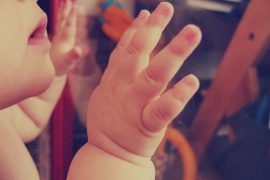By Dr. Laura Markham
“Shaming makes the child wrong for feeling, wanting or needing something.” – Robin Grille
“Harsh, critical parental behavior produces shame-prone, perfectionistic children who then pass the family bad habit down to their children.” – Lynne Namka
Of course, ALL children will at times feel, want or need something and express it in socially unacceptable ways. So today, let’s talk about how we can guide children toward appropriate behavior to get their needs met, without shaming them.
Let’s start by experiencing mild shame. Try this:
Say YES aloud several times. What do you feel? I smile and feel excited, happy.
Now say NO aloud several times. What do you feel? My smile dies. My body feels tight, closed in. I feel a sense of dread. Some people (usually those whose parents were punitive) also feel anger.
That’s mild shame, which is nature’s way of helping us rein in our impulses so we can stay safe, live well with others, and even attain our goals. Dan Siegel calls it the prefrontal cortex clutch, because it allows us to shift from something we want, to something we want more – for instance, not to disappoint our parent, or not to be stared at in church because we’re making inappropriate noise. All kids need to develop that clutch, so they can self-regulate.
How do kids develop this internal clutch to shift gears? It’s neural wiring, so it takes repeated experience in the brain. Every time you set an empathic limit that your child decides to follow, you’re helping him practice.
“You love climbing! But the TV cabinet’s not safe for climbing. Let’s go outside where you can climb safely.” What does the child learn? His impulse to climb is fine. Climbing onto the TV cabinet isn’t safe. Climbing outside is fine. Mom and Dad can be relied on to guide him, and to help him switch gears. The child turns and climbs into the parent’s arms. (This is probably not the first time he’s heard this, so it takes great patience from the parent. But sooner or later, he hears their voice in his head as he begins climbing, and he stops. You might think of it as the beginning of conscience, and self-discipline.)











